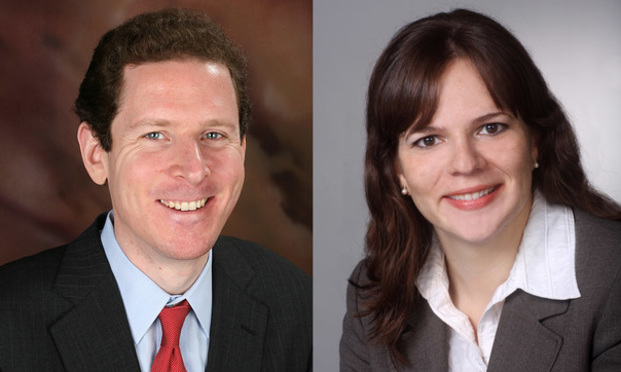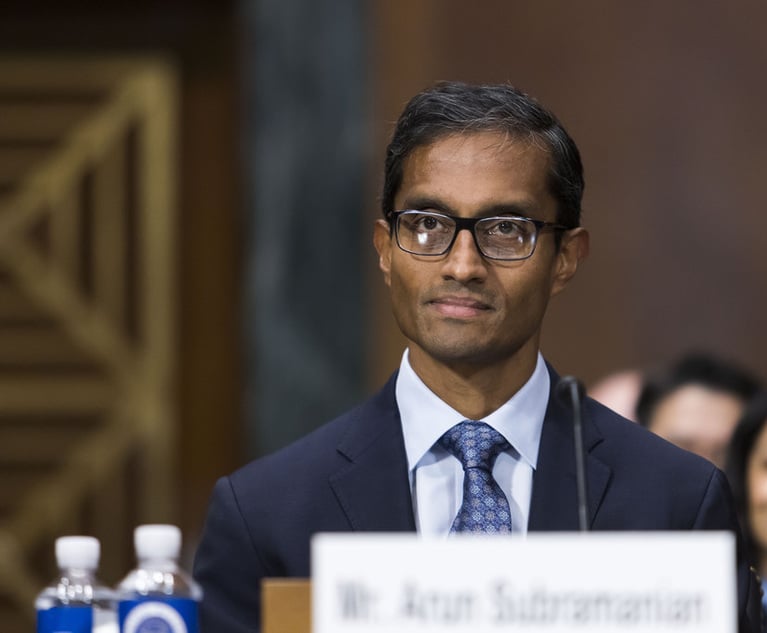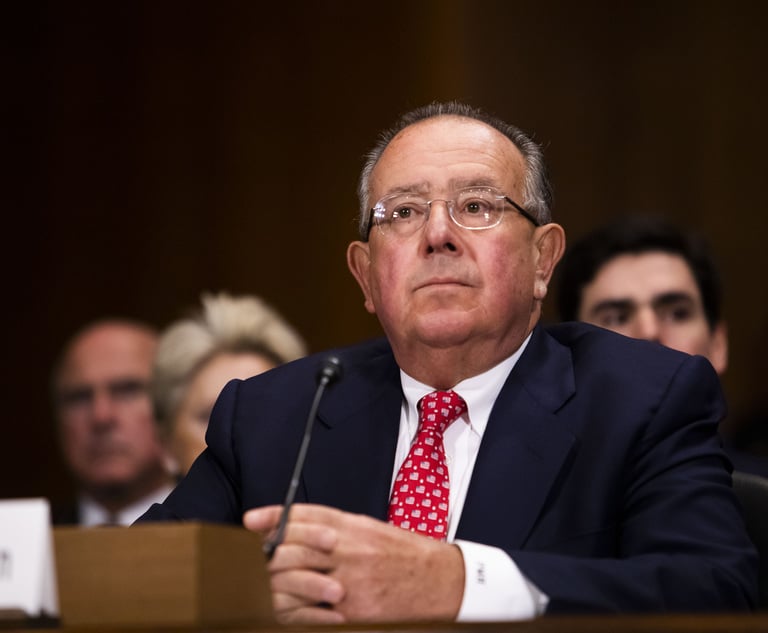Can International Comity Considerations Stop a US Antitrust Prosecution?
As with other types of cross-border investigations, antitrust issues attract the interest of regulators around the globe, and U.S. authorities are active in matters involving foreign players.
August 06, 2018 at 01:32 PM
8 minute read
 Philip C. Patterson, left, and Vera M. Kachnowski, right, with DeFeis, O'Connell & Rose in New York City.
Philip C. Patterson, left, and Vera M. Kachnowski, right, with DeFeis, O'Connell & Rose in New York City.
As with other types of cross-border investigations, antitrust issues attract the interest of regulators around the globe, and U.S. authorities are active in matters involving foreign players. Last January, the Federal Trade Commission and the Department of Justice jointly issued revised guidelines discussing their tools for collaborating with foreign authorities and the application of U.S. antitrust law to conduct involving foreign commerce. See Antitrust Guidelines for International Enforcement and Cooperation (Jan. 13, 2017) (guidelines). Among other factors, the guidelines note that these agencies consider international comity when enforcing federal antitrust laws. But how far does that comity consideration actually go for an individual subject to global antitrust scrutiny?
In United States v. Usher, 17-CR-00019 (RMB) (Usher), three criminal antitrust defendants recently broached this question in connection with their prosecution in the Southern District of New York for allegedly coordinating trading in the Euro/U.S. Dollar currency exchange market. The defendants, all former foreign currency traders, were citizens and residents of the United Kingdom, who worked at London banks, with customers in Europe. Before being charged in the United States, the Serious Fraud Office (SFO) in the U.K. conducted an 18-month investigation of the same conduct and decided not to prosecute any these defendants. In moving to dismiss their indictment here, the defendants noted this determination, and argued that they could not have foreseen being hailed into a U.S. court for conduct that “took place entirely in the United Kingdom, was central to their job responsibilities, and had no perceptible effect in the United States.” The defendants argued, inter alia, that the court should decline to exercise jurisdiction on international comity grounds.
International comity is “the recognition which one nation allows within its territory to the legislative, executive or judicial acts of another nation,” see Hilton v. Guyot, 159 U.S. 113, 163-64 (1895). Comity can come into play in a number of ways, including imparting res judicata effect to judgments of foreign tribunals and through “comity of the courts,” whereby judges “decline to exercise jurisdiction over matters more appropriately adjudged elsewhere.” See Hartford Fire Insurance v. California, 509 U.S. 764, 817 (1993) (Scalia, J., dissenting); see also Royal & Sun Alliance Insurance Co. of Canada v. Century International Arms, 466 F.3d 88, 92-94 (2d Cir. 2006) (outlining considerations related to U.S. court discretion to abstain in deference to litigation pending in a foreign court). In addition, courts can abstain from exercising jurisdiction based on “prescriptive comity,” that is, “the respect sovereign nations afford each other by limiting the reach of their laws.”
The Usher defendants' motion argued, inter alia, that the indictment alleged conduct outside of the Sherman Act's extraterritorial scope and that the prosecution violated due process because the defendants' conduct did not have a sufficient nexus to the United States. The Usher defendants further argued, citing a 10-factor test outlined by the U.S. Court of Appeals for the Second Circuit, that international comity grounds militate against the United States exercising criminal jurisdiction over foreign defendants engaging in entirely foreign conduct, see Usher (Dkt. 63) (citing In re Vitamin C Antitrust Litigation, 837 F.3d 175, 184-86 (2d Cir. 2016) (Vitamin C)).
Those factors are:
- Degree of conflict with foreign law or policy; nationality of the parties, locations or principal places of business of corporations; relative importance of the alleged violation of conduct here as compared with conduct abroad; the extent to which enforcement by either state can be expected to achieve compliance, the availability of a remedy abroad and the pendency of litigation there; Existence of intent to harm or affect American commerce and its foreseeability; possible effect upon foreign relations if the court exercises jurisdiction and grants relief; If relief is granted, whether a party will be placed in the position of being forced to perform an act illegal in either country or be under conflicting requirements by both countries; whether the court can make its order effective; whether an order for relief would be acceptable in this country if made by the foreign nation under similar circumstances; and whether a treaty with the affected nations has addressed the issue.
The Second Circuit noted that the Supreme Court has relied solely upon the first factor—the degree of conflict between U.S. and foreign law—to decide that abstention was inappropriate. Although the Second Circuit's decision in Vitamin C also turned on a Factor 1 conflict-of-law analysis, it read Hartford Fire narrowly and determined that the other factors are still relevant to an abstention analysis. (As an aside, the Supreme Court recently reversed the Vitamin C panel's decision on the distinct issue that it deferred too heavily to one official statement from China in determining that a true conflict of law existed. See Animal Science Products v. Hebei Welcome Pharmaceutical, 585 U.S. __ (June 14, 2018)).
Here, the Usher defendants argued that several of the factors pointed in favor of abstention on comity grounds—namely that they are U.K. citizens and residents (Factor 2), that the alleged conduct “took place entirely in the United Kingdom, on a British trading platform, in a decentralized global market,” and there are no allegations of a specific effect on, or intent to target, the United States (Factors 3 and 5). They also pointed to Factor 4 and noted that the U.K. has a robust enforcement regime for antitrust matters and the SFO conducted a long and thorough investigation of the same conduct and declined to prosecute. They thus argued that the very jurisdiction in which the conspiracy allegedly occurred determined that charges were not warranted.
The government countered that while international comity considerations might be relevant to private suits, the U.S. indictment is a criminal prosecution and thus an implicit determination by the executive branch that U.S. antitrust enforcement outweighs any comity concerns, and the court should not second-guess the executive branch's judgment. They further argued that nearly every Vitamin C factor weighed in its favor, including that there is no true conflict of law here under Factor 1 because the defendants could have complied with U.S. law without violating U.K. law. The government also argued that the alleged conduct is important to U.S. interests and had an intended, foreseeable, and substantial effect on U.S. commerce. In addition, the government stated that the same conduct could be a violation of U.K. law, calling into question whether foreign enforcement could actually achieve compliance and a remedy under Factor 4, given the SFO's declination.
Indeed, the SFO concluded based on its investigation, that “there is insufficient evidence for a realistic prospect of conviction in this jurisdiction. Whilst there were reasonable grounds to suspect the commission of offences involving serious or complex fraud, a detailed review of the available evidence led us to the conclusion that the alleged conduct, even if proven and taken at its highest, would not meet the evidential test required to mount a prosecution for an offence contrary to English law. It has further been concluded that this evidential position could not be remedied by continuing the investigation. This does not reflect or impact on any decision which might be taken by any other agency, whether domestic or overseas, in relation to the same conduct.”
The Usher court ultimately denied the motion to dismiss and agreed with the government that the 10 comity factors did not support abstaining from an exercise of jurisdiction here, see United States v. Usher, 17 Cr. 19 (RMB), 2018 U.S. Dist. LEXIS 88602, at *22-25 (May 4, 2018). In particular, the court noted that there was no “true conflict” between U.S. and U.K. law, and the court was influenced by the SFO's statement that its decision not to prosecute did not reflect or impact any other agency's action. The court also determined that the U.S. Dollar component of the alleged conspiracy could have greater relevance to the United States than the U.K. and that it could have an impact on U.S. commerce.
Conclusion
The Usher defendants' comity argument certainly had some common sense appeal in light of the SFO's extensive prior investigation in the defendants' home jurisdiction. The Usher case, however, may have been a difficult test for a comity abstention, given the apparent absence of a true conflict of law and the involvement of U.S. currency. Moreover, some commentators have speculated that the SFO's nonprosecution decision may have been affected by behind-the-scenes dynamics, such as prior acquittals in a similar SFO Libor prosecution. Nonetheless, future cross-border antitrust or other matters may present other opportunities for defendants to attempt a case dismissal based on international comity concerns.
Philip Patterson and Vera Kachnowski practice white collar criminal defense and international investigations at De Feis O'Connell & Rose, a Manhattan law firm.
This content has been archived. It is available through our partners, LexisNexis® and Bloomberg Law.
To view this content, please continue to their sites.
Not a Lexis Subscriber?
Subscribe Now
Not a Bloomberg Law Subscriber?
Subscribe Now
NOT FOR REPRINT
© 2025 ALM Global, LLC, All Rights Reserved. Request academic re-use from www.copyright.com. All other uses, submit a request to [email protected]. For more information visit Asset & Logo Licensing.
You Might Like
View All
Decision of the Day: Judge Dismisses Defamation Suit by New York Philharmonic Oboist Accused of Sexual Misconduct

Private Equity Giant KKR Refiles SDNY Countersuit in DOJ Premerger Filing Row
3 minute read
Decision of the Day: Judge Rules Brutality Claims Against Hudson Valley Police Officer to Proceed to Trial

Skadden and Steptoe, Defending Amex GBT, Blasts Biden DOJ's Antitrust Lawsuit Over Merger Proposal
4 minute readTrending Stories
- 1Energy Lawyers Field Client Questions as Trump Issues Executive Orders on Industry Funding, Oversight
- 2SEC Revokes Biden-Era Crypto Accounting Guidance
- 3CNN's $16M Settlement With Trump Sets Bad Precedent in Uncertain Times
- 4Regulating Charities: A Small Suggestion
- 5Attorney Emerges as Possible Owner of Historic Miami Courthouse Amid Delays of New Building
Who Got The Work
J. Brugh Lower of Gibbons has entered an appearance for industrial equipment supplier Devco Corporation in a pending trademark infringement lawsuit. The suit, accusing the defendant of selling knock-off Graco products, was filed Dec. 18 in New Jersey District Court by Rivkin Radler on behalf of Graco Inc. and Graco Minnesota. The case, assigned to U.S. District Judge Zahid N. Quraishi, is 3:24-cv-11294, Graco Inc. et al v. Devco Corporation.
Who Got The Work
Rebecca Maller-Stein and Kent A. Yalowitz of Arnold & Porter Kaye Scholer have entered their appearances for Hanaco Venture Capital and its executives, Lior Prosor and David Frankel, in a pending securities lawsuit. The action, filed on Dec. 24 in New York Southern District Court by Zell, Aron & Co. on behalf of Goldeneye Advisors, accuses the defendants of negligently and fraudulently managing the plaintiff's $1 million investment. The case, assigned to U.S. District Judge Vernon S. Broderick, is 1:24-cv-09918, Goldeneye Advisors, LLC v. Hanaco Venture Capital, Ltd. et al.
Who Got The Work
Attorneys from A&O Shearman has stepped in as defense counsel for Toronto-Dominion Bank and other defendants in a pending securities class action. The suit, filed Dec. 11 in New York Southern District Court by Bleichmar Fonti & Auld, accuses the defendants of concealing the bank's 'pervasive' deficiencies in regards to its compliance with the Bank Secrecy Act and the quality of its anti-money laundering controls. The case, assigned to U.S. District Judge Arun Subramanian, is 1:24-cv-09445, Gonzalez v. The Toronto-Dominion Bank et al.
Who Got The Work
Crown Castle International, a Pennsylvania company providing shared communications infrastructure, has turned to Luke D. Wolf of Gordon Rees Scully Mansukhani to fend off a pending breach-of-contract lawsuit. The court action, filed Nov. 25 in Michigan Eastern District Court by Hooper Hathaway PC on behalf of The Town Residences LLC, accuses Crown Castle of failing to transfer approximately $30,000 in utility payments from T-Mobile in breach of a roof-top lease and assignment agreement. The case, assigned to U.S. District Judge Susan K. Declercq, is 2:24-cv-13131, The Town Residences LLC v. T-Mobile US, Inc. et al.
Who Got The Work
Wilfred P. Coronato and Daniel M. Schwartz of McCarter & English have stepped in as defense counsel to Electrolux Home Products Inc. in a pending product liability lawsuit. The court action, filed Nov. 26 in New York Eastern District Court by Poulos Lopiccolo PC and Nagel Rice LLP on behalf of David Stern, alleges that the defendant's refrigerators’ drawers and shelving repeatedly break and fall apart within months after purchase. The case, assigned to U.S. District Judge Joan M. Azrack, is 2:24-cv-08204, Stern v. Electrolux Home Products, Inc.
Featured Firms
Law Offices of Gary Martin Hays & Associates, P.C.
(470) 294-1674
Law Offices of Mark E. Salomone
(857) 444-6468
Smith & Hassler
(713) 739-1250






